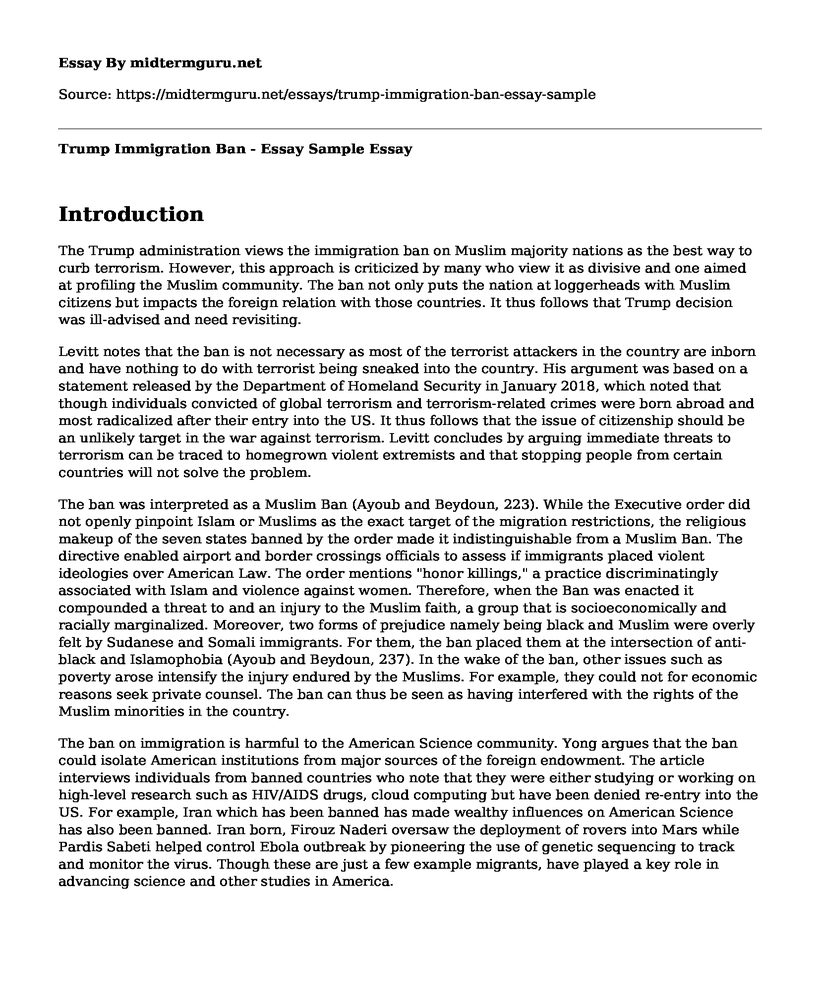Introduction
The Trump administration views the immigration ban on Muslim majority nations as the best way to curb terrorism. However, this approach is criticized by many who view it as divisive and one aimed at profiling the Muslim community. The ban not only puts the nation at loggerheads with Muslim citizens but impacts the foreign relation with those countries. It thus follows that Trump decision was ill-advised and need revisiting.
Levitt notes that the ban is not necessary as most of the terrorist attackers in the country are inborn and have nothing to do with terrorist being sneaked into the country. His argument was based on a statement released by the Department of Homeland Security in January 2018, which noted that though individuals convicted of global terrorism and terrorism-related crimes were born abroad and most radicalized after their entry into the US. It thus follows that the issue of citizenship should be an unlikely target in the war against terrorism. Levitt concludes by arguing immediate threats to terrorism can be traced to homegrown violent extremists and that stopping people from certain countries will not solve the problem.
The ban was interpreted as a Muslim Ban (Ayoub and Beydoun, 223). While the Executive order did not openly pinpoint Islam or Muslims as the exact target of the migration restrictions, the religious makeup of the seven states banned by the order made it indistinguishable from a Muslim Ban. The directive enabled airport and border crossings officials to assess if immigrants placed violent ideologies over American Law. The order mentions "honor killings," a practice discriminatingly associated with Islam and violence against women. Therefore, when the Ban was enacted it compounded a threat to and an injury to the Muslim faith, a group that is socioeconomically and racially marginalized. Moreover, two forms of prejudice namely being black and Muslim were overly felt by Sudanese and Somali immigrants. For them, the ban placed them at the intersection of anti-black and Islamophobia (Ayoub and Beydoun, 237). In the wake of the ban, other issues such as poverty arose intensify the injury endured by the Muslims. For example, they could not for economic reasons seek private counsel. The ban can thus be seen as having interfered with the rights of the Muslim minorities in the country.
The ban on immigration is harmful to the American Science community. Yong argues that the ban could isolate American institutions from major sources of the foreign endowment. The article interviews individuals from banned countries who note that they were either studying or working on high-level research such as HIV/AIDS drugs, cloud computing but have been denied re-entry into the US. For example, Iran which has been banned has made wealthy influences on American Science has also been banned. Iran born, Firouz Naderi oversaw the deployment of rovers into Mars while Pardis Sabeti helped control Ebola outbreak by pioneering the use of genetic sequencing to track and monitor the virus. Though these are just a few example migrants, have played a key role in advancing science and other studies in America.
Conclusion
The essay has analyzed sources that agree and point to the reasons why the Trump ban on immigration is not well informed. It is evident that the ban has impacted negatively on the rights of Muslim individuals, will affect the science community besides not having investigated facts correctly as evidenced by Levitt.
Works Cited
Ayoub, A., and K. Beydoun. "Executive Disorder: The Muslim Ban, Emergency, Advocacy, and the Fires Next Time." Michigan Journal of Race and Law, vol. 22, no. 2, 2017, repository.law.umich.edu/mjrl/vol22/iss2/.
Levitt, Matthew. "Trump's Travel Ban Might Be Legal, but It's Bad Policy." Foreign Policy, 25 Apr. 2018, foreignpolicy.com/2018/04/25/trumps-travel-ban-might-be-legal-but-its-bad-policy/.
Yong, Ed. "Trump's Immigration Ban Is Already Harming American Science." The Atlantic, 29 Jan. 2017, www.theatlantic.com/science/archive/2017/01/trumps-immigration-ban-is-already-harming-americas-scientistsand-its-science/514859/.
Cite this page
Trump Immigration Ban - Essay Sample. (2022, Dec 21). Retrieved from https://midtermguru.com/essays/trump-immigration-ban-essay-sample
If you are the original author of this essay and no longer wish to have it published on the midtermguru.com website, please click below to request its removal:
- Article Review: My First Conk by Malcolm X
- Why the Gap Between the Rich and the Poor Getting Wider
- Essay Sample: How Do Inflation and Unemployment Affect the Economy in Terms of Growth?
- Analysis of Suicide Policy - Paper Example
- Research Paper on US Immigration Policy
- The Racism Continues in the US: Essay Sample
- Uniting and Strengthening America: The USA PATRIOT Act - Essay Sample







